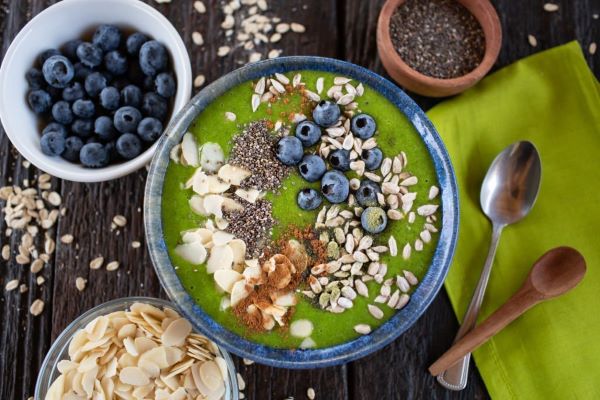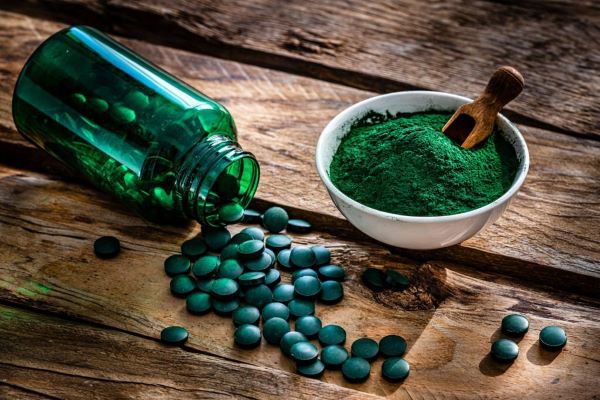Intermittent fasting has taken the health and wellness world by storm. With its promising benefits, such as weight loss, improved mental clarity, and enhanced longevity, it’s no wonder everyone, from celebrities to fitness enthusiasts, is trying.
But as the fasting window closes, the question arises – what supplements can be taken without breaking the fast? Does spirulina break a fast?
Enter Spirulina, often hailed as a ‘superfood.’ These blue-green algae are packed with nutrients and have been a staple in health-conscious communities and athletes for years. But does this nutritional powerhouse have a place in your fasting regimen?
In this article, we will dive deep into Spirulina and intermittent fasting. We’ll explore the nutritional content of Spirulina, its caloric impact, and whether it’s a boon or a fast breaker.
Whether you’re a fasting veteran or just getting started, this guide is your ticket to making informed decisions about incorporating Spirulina into your intermittent fasting journey.
Let’s get started!
Does Spirulina Break a Fast? Spirulina and Its Caloric Impact
One of the key aspects of Spirulina is its low-calorie content. With just 20 calories per tablespoon. Technically, consuming anything with caloric value should break a fast. However, 20 calories per tablespoon and a rich nutrient profile of spirulina can be beneficial during fasting.
Does creatine have calories?
Nutritional Breakdown of Spirulina
Spirulina is often called a “superfood” due to its impressive nutritional profile. Here’s what you get in a single tablespoon (7 grams) of Spirulina:
- Protein: 4 grams
- Vitamin B1 (Thiamine): 11% of the RDA
- Vitamin B2 (Riboflavin): 15% of the RDA
- Vitamin B3 (Niacin): 4% of the RDA
- Copper: 21% of the RDA
- Iron: 11% of the RDA
In addition, it contains decent amounts of magnesium, potassium, manganese, and small amounts of almost every other nutrient your body needs.
Spirulina is a rich source of gamma-linoleic acid (GLA) that plays a significant role in improving human body functions with a positive effect on most of the chronic diseases of modern society, including cancer, diabetes, heart disease, arthritis, and Alzheimer’s disease.
It also packs in antioxidants, which can protect against oxidative damage.
Spirulina and Nutritional Benefits During Fasting
A Nutrient Powerhouse
Spirulina is often referred to as a superfood and for good reason. These blue-green algae are packed with nutrients that can be especially beneficial during fasting. When you’re not consuming food for extended periods, ensuring your consumption is highly nutritious is crucial. Spirulina fits the bill perfectly.
Rich in Protein
One of the standout features of Spirulina is its high protein content. It comprises about 60-70% protein, which is vital during fasting. Proteins are the building blocks of your muscles, and taking them in adequate amounts can help in muscle repair and growth.

Full of Vitamins and Minerals
Spirulina is a treasure trove of vitamins and minerals. It contains Vitamins B1, B2, B3, B6, C, A, and E. It’s also rich in minerals such as iron, magnesium, calcium, and potassium. These vitamins and minerals are essential for various bodily functions and can help maintain your health during fasting.
Antioxidant and Anti-inflammatory Properties
The antioxidant properties of Spirulina are one of its most significant benefits, especially during fasting. It contains phycocyanin, which fights free radicals and has anti-inflammatory effects. This can be particularly beneficial during fasting, as the body undergoes cellular repair processes.
Boosts Metabolism
Including Spirulina in your diet during fasting can also boost your metabolism. A faster metabolism during fasting can mean more calories burned, and more weight loss or maintenance, depending on your goals.
Supports Gut Health
Evidence suggests Spirulina can support gut health, which is crucial during fasting. A healthy gut can lead to better digestion and absorption of the nutrients consumed during your eating windows.
Does Spirulina Cause Gas?
Spirulina can cause gas in some individuals as it contains fiber and certain complex carbohydrates that may not be fully digested in the stomach and small intestine. When these undigested carbohydrates reach the large intestine, bacteria break them down through fermentation, which can produce gas as a byproduct.
This can lead to bloating, flatulence, and discomfort in some cases.
Immune System Support
Fasting can sometimes take a toll on the immune system. Spirulina’s rich nutrient content can help support the immune system, ensuring your body is better equipped to fight infections and diseases.
Expert Tips on Incorporating Spirulina in Fasting
Incorporating spirulina into your fasting regimen can be a game-changer. However, it’s essential to do it right to reap the maximum benefits. Here are some expert tips to help you seamlessly integrate spirulina into your fasting schedule.
Start Slow
Gradual Introduction
When you first start taking spirulina, it’s best to ease into it. Begin with a small dose and gradually increase it over a few weeks. This allows your body to adjust to the supplement and minimizes the risk of any adverse reactions.
Choose the Right Form
Spirulina Powder vs Tablets
Spirulina comes in various forms, including powders and tablets. Powders can be mixed into water or smoothies, while tablets are more convenient for those on the go. Choose the form that best fits your lifestyle and preferences.

Timing is Key
When to Take Spirulina
The timing of when you take spirulina during your fasting period is crucial. It’s generally best to take it early in your fasting window. This allows your body to utilize the nutrients effectively throughout the fasting period.
How Long Does Spirulina Stay in Your System?
Generally, spirulina is considered to have a relatively short half-life, and most of its components are likely to be metabolized and excreted within a few hours to a day.
However, the beneficial effects of spirulina, such as its antioxidant properties, may continue to impact the body for a longer period. Regular consumption of spirulina can lead to a more sustained presence of its nutrients in the body.
Pair with Other Nutrients
Synergistic Combinations
Combining spirulina with other nutrients can enhance its benefits. For example, taking spirulina with vitamin C can improve iron absorption from spirulina. Similarly, pairing it with a source of healthy fats can help absorb fat-soluble vitamins.
Check how vitamin E supplementation reduces liver iron levels and boosts antioxidant effects.
Stay Hydrated
Importance of Water
Drinking plenty of water is always important, especially when taking spirulina during fasting. This helps in the absorption of nutrients and supports overall health.
Listen to Your Body
Monitor Your Response
Pay attention to how your body responds to spirulina. If you notice any adverse reactions or if it makes you feel unwell, it’s best to reduce the dosage or consult a healthcare professional.
Consult a Healthcare Professional
Expert Guidance
Before making any significant changes to your fasting regimen, including adding supplements like spirulina, it’s always a good idea to consult a healthcare professional. They can provide personalized advice and ensure the supplement suits your health needs.
Quality Matters
Choose a Reputable Brand
Not all spirulina supplements are created equal. It’s essential to choose a high-quality product from a reputable brand. Look for third-party testing and certifications to ensure the product is contaminant-free.
Conclusion
Incorporating spirulina into your intermittent fasting routine can be a game-changer. With its rich nutritional profile, spirulina can help bridge the nutrient gap during fasting periods. However, it’s essential to be mindful of the quantity consumed to avoid breaking the fast inadvertently.
Consulting a nutritionist or healthcare professional for personalized advice can be beneficial. Thoughtfully integrating spirulina and other supplements can harness its health-boosting properties while staying true to your fasting goals.
Remember, moderation and informed choices are key to maximizing your health and wellness journey. Happy fasting!

I am a health and wellness enthusiast working in a Pittsburgh-based wellness clinic. My primary role as a consultant is to tailor a balanced lifestyle for my patients, where positive steps and potent supplements play a synergistic role.

